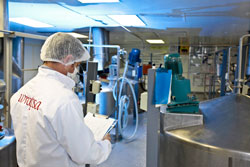
Top stories






More news















In light of recent new regulations and a more stringent approach to manufacturing, a conversation has been started on what constitutes safe and Good Manufacturing Practices (GMP) - particularly in areas like medicine and food production. One vital element to GMP is being PIC/S compliant. So what is PIC/S, and why is it important for the quality of medicine production?

Nardus Alberts, CEO of Wrapsa - reputed to be SA's largest pharmaceutical contract manufacturer - explains that the Pharmaceutical Inspection Co-operation Scheme (also known as PIC/S), is an international governing organisation that was created in 1995 as an extension to the Pharmaceutical Inspection Convention (PIC) of 1970. "The PIC/S body is made up of an informal collaboration between regulatory authorities within the field of pharmaceutical GMP," says Alberts. "PIC/S is contributed to by authorities primarily in Europe who have comparable GMP systems and inspections in place, but is participated in by the Americas, Asia, Australia, and more recently, South Africa."
The PIC/S programme is geared towards boosting co-operation and streamlining GMP practices and inspections globally, through the development of common standards. "These standards include stringent monitoring and inspection of manufacturing practices, the provision of in-depth training, as well as sharing valuable knowledge and mutual confidence," continues Alberts. The PIC/S organisation's mission statement, 'To lead the international development, implementation, and maintenance of harmonised GMP standards and quality systems of inspectorates in the field of medicinal products,' is the core driving force of the international collaboration.

Improving the quality of health care is a global priority, and as such, the impact of South Africa's PIC/S status is hugely beneficial to local consumers and the economy alike. Industries benefitting from South Africa's compliance include the pharmaceutical industry, non-governmental organisations, policy makers, and regulatory authorities. "For medicines in particular, our PIC/S status ensures that the safety, efficacy and quality of all consumables is held to a high standard and a stringent set of controls," says Alberts. "Currently, South Africa is the only PIC/S compliant country in Africa, which further boosts our desirability for international businesses entering the continent."
The Medicines Control Council (MCC) included certain amendments to the SA Guide to Good Manufacturing Practice for medicines in South Africa in accordance with PIC/S, which include regulations concerning packaging and labelling, importing and exporting, distribution, wholesaling and of course, manufacturing conditions and facilities management.
"While many of these elements are not visible to the consumers who are in stores buying medicines, they certainly benefit hugely from South Africa's compliance, in terms of trusting in the safety of the MCC-approved products they purchase." says Alberts. "While not all local manufacturers are currently PIC/S compliant, those who make the investment in ensuring their processes are up to standard present far more desirable options for new and sustainable opportunities in the field."
Wrapsa was founded in 1983 by Pretoria native and Wrapsa CEO, Nardus Alberts, and since then the organisation has grown steadily from modest beginnings to become southern Africa's largest independently owned and fully accredited bona fide contract manufacturer in the arena
Visit www.wrapsa.co.za for more information.